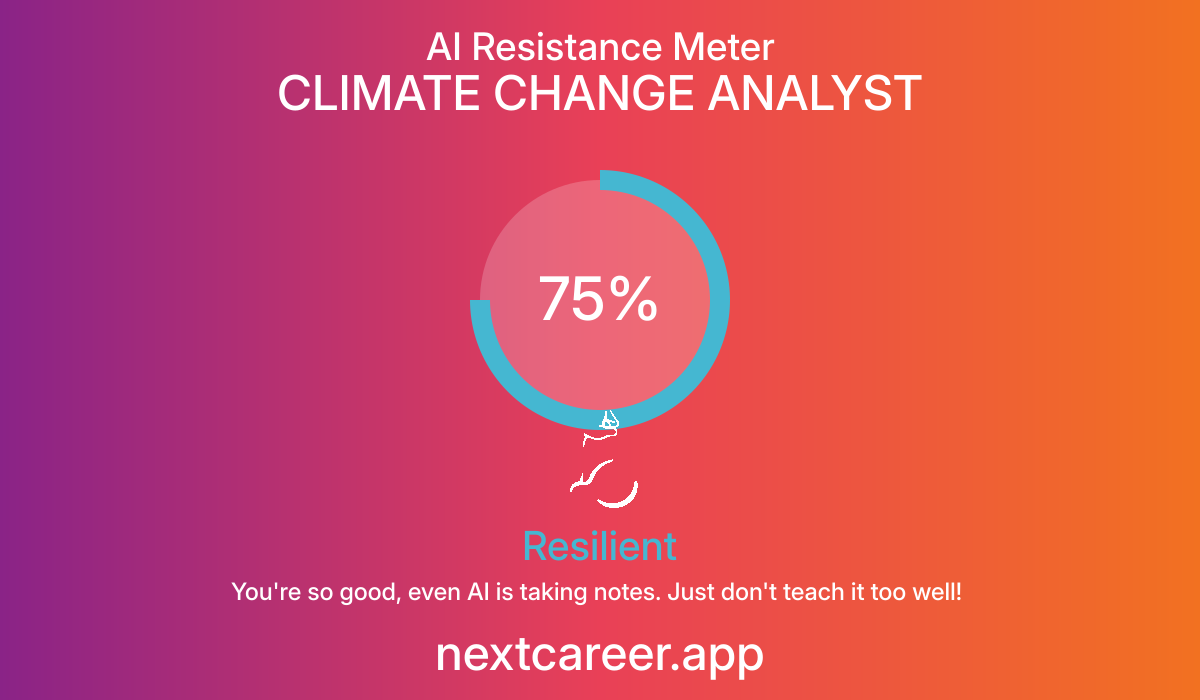AI Resistance Analysis
CLIMATE CHANGE ANALYST
CLIMATE CHANGE ANALYST
AI Resistance Score
AI Resistance Meter
Resilient
CLIMATE CHANGE ANALYST
You're so good, even AI is taking notes. Just don't teach it too well!
A Climate Change Analyst engages in the evaluation and interpretation of complex data regarding climate patterns, environmental impact studies, and policy recommendations. This role demands a combination of cognitive skills, emotional intelligence, and interdisciplinary collaboration, making it moderately resistant to full automation by AI. As AI technologies evolve, they will likely enhance the analytical capabilities of climate change analysts rather than replace them entirely.
A Climate Change Analyst engages in the evaluation and interpretation of complex data regarding climate patterns, environmental impact studies, and policy recommendations. This role demands a combination of cognitive skills, emotional intelligence, and interdisciplinary collaboration, making it moderately resistant to full automation by AI. As AI technologies evolve, they will likely enhance the analytical capabilities of climate change analysts rather than replace them entirely.
Key Factors
- Cognitive Tasks: The analytical capabilities of AI are rapidly advancing, enabling AI systems to process large datasets, identify patterns, and generate insights much faster than humans.
- Emotional Intelligence: The need for building relationships with stakeholders, communicating research findings, and advocating for policies requires a human touch that AI cannot replicate.
- Physical Skills: This job has minimal physical skill requirements, as it is primarily office-based and involves data analysis.
- Creative Thinking: The role often requires innovative thinking to devise new strategies for climate resilience, which AI may assist with but cannot fully automate.
Human Advantages
- Complex understanding of the socio-economic impacts of climate change.
- Ability to navigate political systems and advocate for sustainability measures effectively.
- Skill in interpreting qualitative data and community sentiments.
AI Vulnerabilities
- Automated data analysis could potentially replace repetitive tasks of data collection and initial interpretation.
- AI could generate reports and predictive models, reducing the need for manual analytical processes.
Recommended Actions
- Invest in training programs that enhance skills in AI and data analytics to augment human capability.
- Focus on fostering strong communication skills for stakeholder engagement and advocacy.
- Encourage interdisciplinary collaboration to develop holistic strategies that integrate diverse perspectives on climate issues.
In the near-term, AI will serve as a powerful tool for Climate Change Analysts by providing enhanced data analysis and modeling capabilities. However, the human element, particularly in communication and advocacy roles, remains essential. Over the long run, as more sophisticated AI systems emerge, the role of Climate Change Analysts may shift toward oversight and governance of AI systems, ensuring ethical and effective outcomes in climate policy and environmental strategies.

Why Calculate AI Resistance?
Understanding how AI-resistant your career is becoming increasingly important in today's rapidly evolving job market. Our analysis combines multiple factors including required human skills, technological adaptability, and future industry projections to give you a comprehensive view of your career's sustainability.